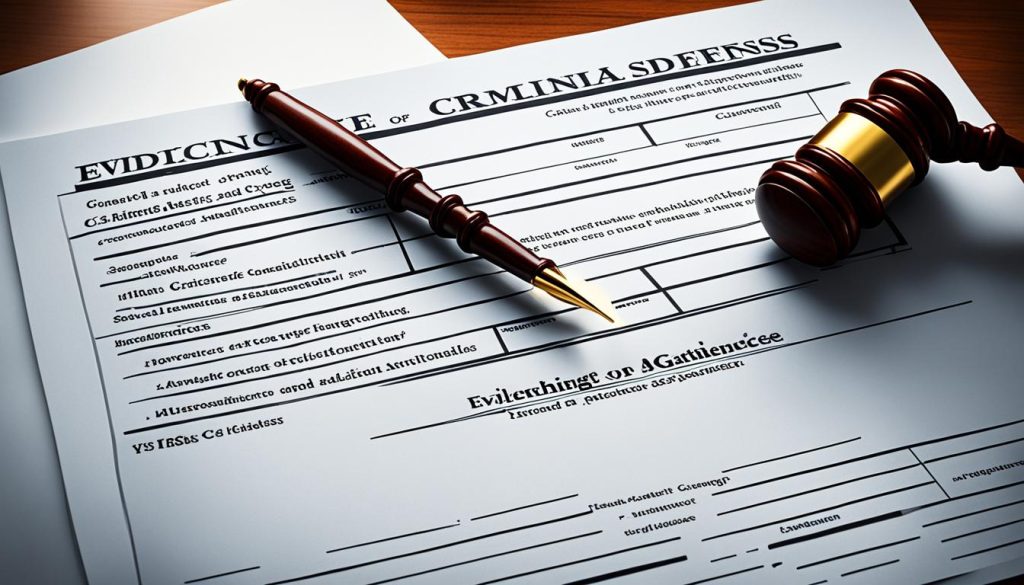- 1. Understanding the Charges Against You
- 2. Gathering and Analyzing Evidence
- 3. Building a Strong Legal Team
- 4. Developing a Persuasive Argument
- 5. Preparing for Trial
- 6. Asserting Constitutional Violations
- 7. Establishing an Alibi
- 8. Criminal Law Defense
- 9. Arguing Self-Defense, Entrapment, or Insanity
- 10. Protecting Your Legal Rights
- 11. Conclusion
- 12. FAQ
- 12.1 What are the key elements of a strong criminal defense strategy?
- 12.2 Why is it important to fully comprehend the charges you are facing?
- 12.3 How can gathering and analyzing evidence strengthen your criminal defense?
- 12.4 Why is it crucial to have a competent legal team on your side?
- 12.5 What is the importance of crafting a persuasive argument?
- 12.6 How can thorough trial preparation increase your chances of success?
- 12.7 Why is it important to assert any violations of your constitutional rights?
- 12.8 How can establishing an alibi be a compelling defense strategy?
- 12.9 What are some common criminal law defense strategies?
- 12.10 Why is it crucial to understand and protect your legal rights?
- 13. Source Links
When facing criminal charges, it is crucial to have a strong defense strategy in place. A well-prepared defense can make all the difference in the outcome of your case. This article will explore the key elements of a robust criminal defense strategy. Understanding these elements will help you build a solid defense, whether navigating the legal system on your own or seeking the guidance of a professional. Building a strong criminal defense requires a comprehensive approach, from understanding the specific charges to preparing for trial.
Key Takeaways
- Understand the specific criminal charges you are facing and the associated penalties.
- Gather and analyze all relevant evidence to support your defense.
- Build a strong legal team with experienced criminal defense attorneys.
- Develop a persuasive and well-crafted legal argument for your case.
- Thoroughly prepare for trial, anticipating potential challenges and courtroom procedures.
Understanding the Charges Against You
When facing criminal charges, it is crucial to have a comprehensive understanding of the specific laws and regulations that apply to your case. This knowledge will be invaluable in developing an effective criminal defense strategy and navigating the complexities of the criminal justice system.
Researching Specific Laws and Regulations
Begin by thoroughly researching the criminal charges you are facing. Familiarize yourself with the relevant statutes, codes, and legal precedents that govern the alleged offense. Understanding the specific elements of the crime, the burden of proof required by the prosecutors, and any potential defenses can provide you with a stronger foundation for your defense.
Familiarizing Yourself with Potential Penalties
In addition to understanding the charges, it is crucial to educate yourself on the potential penalties associated with a conviction. This information will help you make informed decisions throughout the legal process, including whether to accept a plea bargain or proceed to trial. Knowing the sentencing guidelines, potential fines, and any collateral consequences, such as probation or incarceration, will enable you to better evaluate the risks and benefits of your defense strategies.
Gathering and Analyzing Evidence
Building a strong
criminal defense
strategy requires a meticulous approach to gathering and analyzing evidence. This crucial step involves collecting any relevant documents, photographs, videos, or witness statements that can substantiate your case. Carefully reviewing this evidence is essential to identify any inconsistencies or weaknesses that can be challenged in the courtroom.
Collecting Relevant Documents, Photos, and Videos
Gather all documents, photographs, and videos that may support your
defense strategies
. This could include receipts, surveillance footage, or witness statements that establish your whereabouts or provide alternative explanations for the alleged incident. Meticulously organizing and cataloging this evidence will enable your
criminal defense attorney
to present a cohesive and compelling case.
Identifying Inconsistencies and Weaknesses
Thoroughly examining the evidence collected by the
prosecutors
is equally important. Scrutinize the
courtroom proceedings
and any
plea bargains
offered to uncover potential inconsistencies or weaknesses in the
prosecution’s case
. This analysis can reveal flaws in the
criminal justice system’s
handling of the case, which can be leveraged to your advantage during
trial preparation
and in the
sentencing guidelines
The ability to gather and analyze relevant evidence is a fundamental aspect of a
criminal defense strategy
. By carefully reviewing all available information, you and your
criminal defense attorney
can build a robust case, identify potential
weaknesses
, and develop the most effective
legal representation
to protect your rights and interests throughout the
criminal appeals process
.
Building a Strong Legal Team
When facing criminal charges, assembling a competent legal team is crucial to your defense strategy. Seeking the assistance of experienced criminal defense attorneys who specialize in the specific charges you are facing can make a significant difference in the outcome of your case.
Seeking Experienced Criminal Defense Attorneys
Criminal defense attorneys with a track record of success in cases similar to yours will possess the expertise and knowledge necessary to navigate the complexities of the criminal justice system. They can provide you with the most effective legal representation, guiding you through the entire process and ensuring your rights are protected every step of the way.
Leveraging Expertise in Legal System Navigation
Experienced criminal defense lawyers have a deep understanding of courtroom proceedings, plea bargains, trial preparation, and sentencing guidelines. By leveraging their expertise, you can develop a robust defense strategy that addresses the unique circumstances of your case. Their knowledge of the criminal law defense, legal representation, and defense strategies can be invaluable in securing the best possible outcome.
| Key Advantages of Working with Experienced Criminal Defense Attorneys |
|---|
|
By assembling a strong legal team with seasoned criminal defense attorneys, you can increase your chances of a favorable outcome and protect your future. Their criminal law expertise and criminal trial advocacy can be invaluable in navigating the criminal appeals process and achieving the best possible resolution for your criminal law defense.
Developing a Persuasive Argument
Crafting a compelling argument is pivotal to an effective
criminal law defense
. As you navigate the complexities of the
, it is crucial to understand the strengths and weaknesses of your case. This knowledge will allow you to develop a clear and concise narrative that supports your
.
Understanding Case Strengths and Weaknesses
Thoroughly analyze the evidence and circumstances surrounding your case to identify potential
challenges, as well as areas where you can mount a strong defense. By understanding the nuances of your case, you can craft a persuasive argument that effectively addresses the
and raises reasonable doubt.
Crafting a Clear and Concise Narrative
The ability to communicate your
effectively is a critical skill. Develop a clear and coherent narrative that presents your case in a compelling manner. This may involve
, highlighting mitigating factors, or challenging the
. By crafting a narrative that resonates with the court, you can significantly influence the outcome of your case.
can make all the difference in the world. By understanding the strengths and weaknesses of your case and developing a persuasive argument, you can maximize your chances of achieving the best possible outcome.
Preparing for Trial
If your criminal case goes to trial, thorough preparation is critical to your criminal law defense. Work closely with your legal representation to anticipate potential challenges and develop effective strategies to overcome them. This includes preparing for cross-examinations, crafting compelling opening and closing statements, and ensuring you fully understand courtroom procedures.
Anticipating Potential Challenges
Your criminal defense attorney will work tirelessly to identify any potential challenges that may arise during the trial proceedings. By anticipating these challenges, they can develop proactive defense strategies to mitigate their impact and strengthen your case. This comprehensive approach helps you navigate the criminal justice system with confidence and increases your chances of a favorable outcome.
Developing Effective Opening and Closing Statements
The opening and closing statements are crucial components of your trial preparation. Your legal team will craft a clear and concise narrative that effectively communicates your defense strategies to the prosecutors and the court. These statements should be meticulously prepared to make a lasting impression and persuasively advocate for your rights and interests.
Understanding Courtroom Procedures
Familiarizing yourself with the courtroom proceedings and trial preparation protocols is essential. Your criminal defense attorney will ensure you are fully aware of the various plea bargains, sentencing guidelines, and other procedural aspects that may come into play during the trial. This comprehensive understanding will help you navigate the criminal law defense process with confidence and make informed decisions throughout the proceedings.
Asserting Constitutional Violations
If your constitutional rights have been violated, it is essential to assert this as part of your criminal law defense strategy. Carefully examine the circumstances surrounding your arrest and any investigative procedures used by law enforcement to identify potential violations of your constitutional protections. Challenging any infringement on your constitutional rights can be a powerful component of your criminal defense.
The Fourth Amendment of the U.S. Constitution protects individuals from unreasonable searches and seizures by the government. If the police conducted a search without a valid warrant or probable cause, or if they used excessive force during your arrest, you may have grounds to assert a constitutional violation. Similarly, the Fifth Amendment guarantees your right to remain silent and not self-incriminate, which could be relevant if the authorities coerced you into making incriminating statements.
By challenging any constitutional violations in your case, you can weaken the prosecution’s argument and potentially have crucial evidence or statements excluded from the courtroom proceedings. This can significantly improve your chances of a favorable outcome in your criminal case. It is essential to work closely with your criminal defense attorney to thoroughly investigate and identify any potential constitutional issues that can be leveraged in your defense strategy.
Establishing an Alibi
Providing a credible alibi can be a compelling criminal law defense strategy if you were not present at the time and location of the alleged crime. Collecting relevant documentation, such as receipts, witness statements, or other evidence, can help establish your whereabouts during the incident. Presenting a strong alibi can significantly undermine the prosecution’s case and raise reasonable doubt about your involvement.
When building an alibi, it’s crucial to carefully document your activities and gather any supporting materials that can corroborate your whereabouts. This may include obtaining legal representation from an experienced criminal defense attorney who can assist in gathering and presenting the evidence effectively.
Establishing an alibi requires meticulous attention to detail and a thorough understanding of the criminal justice system and courtroom proceedings. Your defense strategies should aim to create a clear and convincing narrative that demonstrates your innocence and casts doubt on the prosecution’s criminal charges.
| Key Considerations for Establishing an Alibi | Potential Alibi Evidence |
|---|---|
|
|
Presenting a strong alibi can be a crucial component of your criminal defense strategies and can significantly impact the outcome of your case. By meticulously documenting your whereabouts and leveraging all available evidence, you can challenge the prosecution’s narrative and create reasonable doubt in the minds of the prosecutors and the court.

Criminal Law Defense
Navigating the complexities of criminal law defense can be daunting, but there are various strategies that can be employed to protect your rights and interests. These may include asserting constitutional violations, challenging the prosecution’s evidence, or arguing for mitigating circumstances. An experienced criminal defense attorney will be able to evaluate the specifics of your case and develop the most effective legal strategy to defend against the criminal charges you are facing.
Depending on the unique circumstances of your case, your criminal defense attorney may utilize a range of defense strategies, such as:
- Challenging the legality of the courtroom proceedings and any potential violations of your constitutional rights
- Disputing the prosecution’s evidence and raising reasonable doubt about your involvement
- Arguing for mitigating circumstances that may reduce the severity of the criminal charges or the sentencing guidelines
- Negotiating plea bargains with the prosecutors to minimize the potential consequences
- Preparing a compelling defense strategy for trial, including effective opening and closing statements
- Navigating the criminal appeals process if necessary to challenge the legal outcome
The key to a successful criminal law defense is to work closely with a knowledgeable and experienced criminal defense attorney who can evaluate the specifics of your case, identify the most effective defense strategies, and provide you with the guidance and legal representation needed to protect your rights and interests throughout the criminal justice system.
Arguing Self-Defense, Entrapment, or Insanity
When facing criminal charges, it is crucial to carefully evaluate the specific circumstances of your case. Depending on the details, you may be able to argue for affirmative defenses such as self-defense, entrapment, or insanity. These types of defenses can be powerful tools in your criminal law defense strategy, as they challenge the underlying premise of the charges or the prosecution’s ability to prove intent.
Self-defense is a common defense strategy in cases involving allegations of violence or physical altercations. If you can demonstrate that your actions were taken to protect yourself or others from an immediate threat of harm, you may be able to justify your conduct and avoid criminal liability. Entrapment, on the other hand, occurs when law enforcement officials induce or coerce an individual into committing a crime they would not have otherwise committed. Proving entrapment can undermine the prosecution’s case and lead to the dismissal of charges.
In some instances, the defense of insanity may be applicable. This defense asserts that the defendant lacked the mental capacity to understand the nature and consequences of their actions or to distinguish right from wrong at the time of the alleged crime. Establishing an insanity defense requires a comprehensive evaluation by mental health professionals and can be a complex legal strategy to pursue.
Carefully evaluating the specific circumstances of your case and the applicability of these affirmative defenses is crucial in building a comprehensive and effective criminal defense. Consult with an experienced criminal defense attorney who can guide you through the process and develop the most appropriate legal strategy to protect your rights and interests.

Protecting Your Legal Rights
When facing criminal charges, it is essential to understand and protect your legal rights. This includes the fundamental rights to remain silent and to have legal representation. Exercising these rights can be crucial in safeguarding your interests and preventing the prosecution from obtaining any incriminating information or statements.
Understanding the Right to Remain Silent
The right to remain silent is a cornerstone of the criminal justice system. This right allows you to refrain from making any statements or providing information that could potentially incriminate you. Invoking your right to remain silent can prevent the prosecution from using your own words against you in a criminal trial or during courtroom proceedings.
Exercising the Right to Legal Representation
Equally important is your right to legal representation. By retaining an experienced criminal defense attorney, you can ensure that your rights are protected throughout the entire legal process. Your attorney will advise you on the best course of action, advocate on your behalf, and employ defense strategies tailored to the specifics of your criminal case.
An experienced criminal defense attorney can guide you on the most effective way to assert and safeguard your constitutional rights during courtroom proceedings, plea bargain negotiations, and any other interactions with prosecutors or the criminal justice system. Protecting your legal rights is paramount in building a strong criminal law defense.
Conclusion
Building a strong criminal law defense is a multi-faceted endeavor that requires a comprehensive approach. From understanding the specific criminal charges and applicable laws to gathering evidence and developing a persuasive argument, each step is crucial in protecting your rights and achieving the best possible outcome. Seeking the guidance of experienced criminal defense attorneys and leveraging their expertise in navigating the complexities of the criminal justice system can greatly increase your chances of success.
Remember, your rights and your future are at stake, so it is essential to take a proactive and strategic approach to your criminal defense. Explore the various defense strategies, such as asserting constitutional violations, establishing an alibi, or arguing for mitigating circumstances, to build the most effective case. With the right legal representation and a well-executed defense, you can navigate the courtroom proceedings, plea bargains, and trial preparation with confidence, ultimately leading to the best possible resolution of your criminal case.
Regardless of the criminal charges you are facing, a strategic and proactive approach to your criminal defense is crucial. By understanding the sentencing guidelines, criminal law expertise, and the intricacies of criminal trial advocacy and the criminal appeals process, you can position yourself for the most favorable outcome and protect your legal rights throughout the legal process.
FAQ
What are the key elements of a strong criminal defense strategy?
Building a strong criminal defense strategy involves understanding the specific charges, gathering and analyzing evidence, assembling a competent legal team, crafting a persuasive argument, preparing thoroughly for trial, asserting any constitutional violations, and establishing a credible alibi if applicable.
Why is it important to fully comprehend the charges you are facing?
Fully understanding the charges against you, the applicable laws and regulations, and the potential penalties is a crucial first step in developing an effective criminal defense strategy. This knowledge will allow you to make informed decisions throughout the legal process.
How can gathering and analyzing evidence strengthen your criminal defense?
Collecting relevant documents, photographs, videos, and witness statements, and carefully reviewing this evidence to identify any inconsistencies or weaknesses in the prosecution’s case, is essential for building a robust defense strategy.
Why is it crucial to have a competent legal team on your side?
Seeking the guidance of experienced criminal defense attorneys who specialize in your charges can greatly improve your chances of success. They possess the expertise and knowledge to navigate the complexities of the legal system and provide you with the best possible defense.
What is the importance of crafting a persuasive argument?
Developing a clear and concise narrative that supports your innocence or mitigates your culpability can significantly impact the outcome of your case. Presenting a compelling argument that resonates with the court is a critical skill for any criminal defense attorney.
How can thorough trial preparation increase your chances of success?
Preparing for potential challenges, developing effective opening and closing statements, and familiarizing yourself with courtroom procedures are essential for navigating the complexities of the trial and presenting a well-crafted defense.
Why is it important to assert any violations of your constitutional rights?
Carefully examining the circumstances surrounding your arrest and any investigative procedures used by law enforcement to identify potential infringements on your constitutional rights can be a powerful component of your criminal defense strategy.
How can establishing an alibi be a compelling defense strategy?
Providing credible documentation or witness statements to establish your whereabouts at the time of the alleged crime can significantly undermine the prosecution’s case and raise reasonable doubt about your involvement.
What are some common criminal law defense strategies?
Criminal law defense strategies may include asserting constitutional violations, challenging the prosecution’s evidence, arguing for mitigating circumstances, or presenting affirmative defenses such as self-defense, entrapment, or insanity.
Why is it crucial to understand and protect your legal rights?
Exercising your right to remain silent and your right to legal representation can be crucial in safeguarding your interests and preventing the prosecution from obtaining incriminating information or statements. An experienced criminal defense attorney can advise you on the best way to assert and protect your constitutional rights throughout the legal process.
Source Links
- https://www.cmcdefense.com/blog/2023/july/key-elements-of-a-strong-criminal-defense-strate/
- https://www.demilialaw.com/criminal-defense/5-steps-to-building-a-strong-criminal-defense/
- https://thenationaltriallawyers.org/article/building-a-criminal-defense-case/

